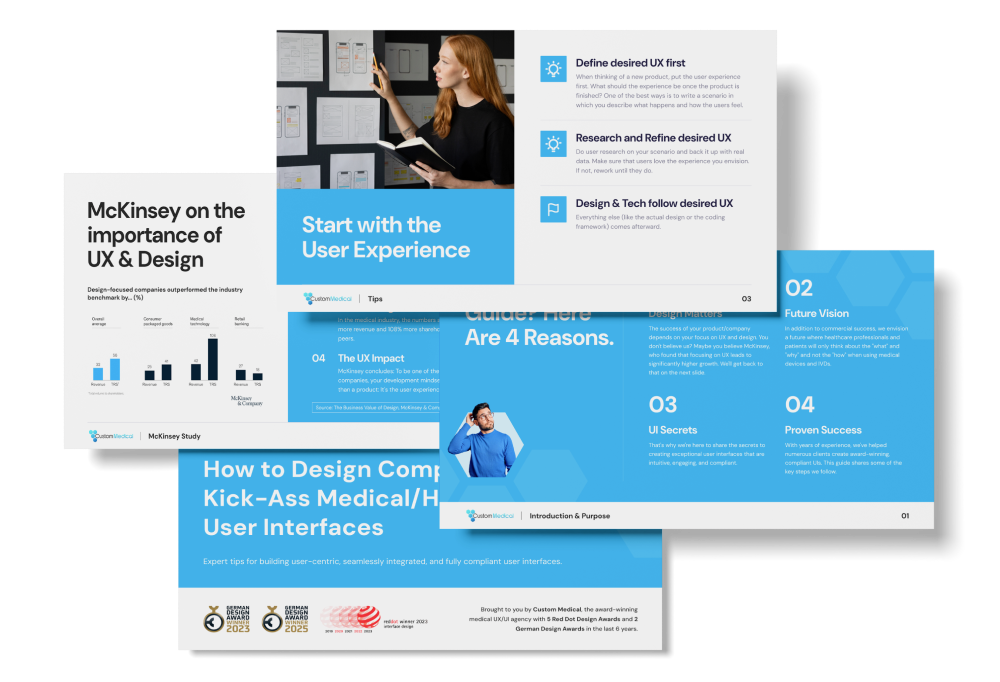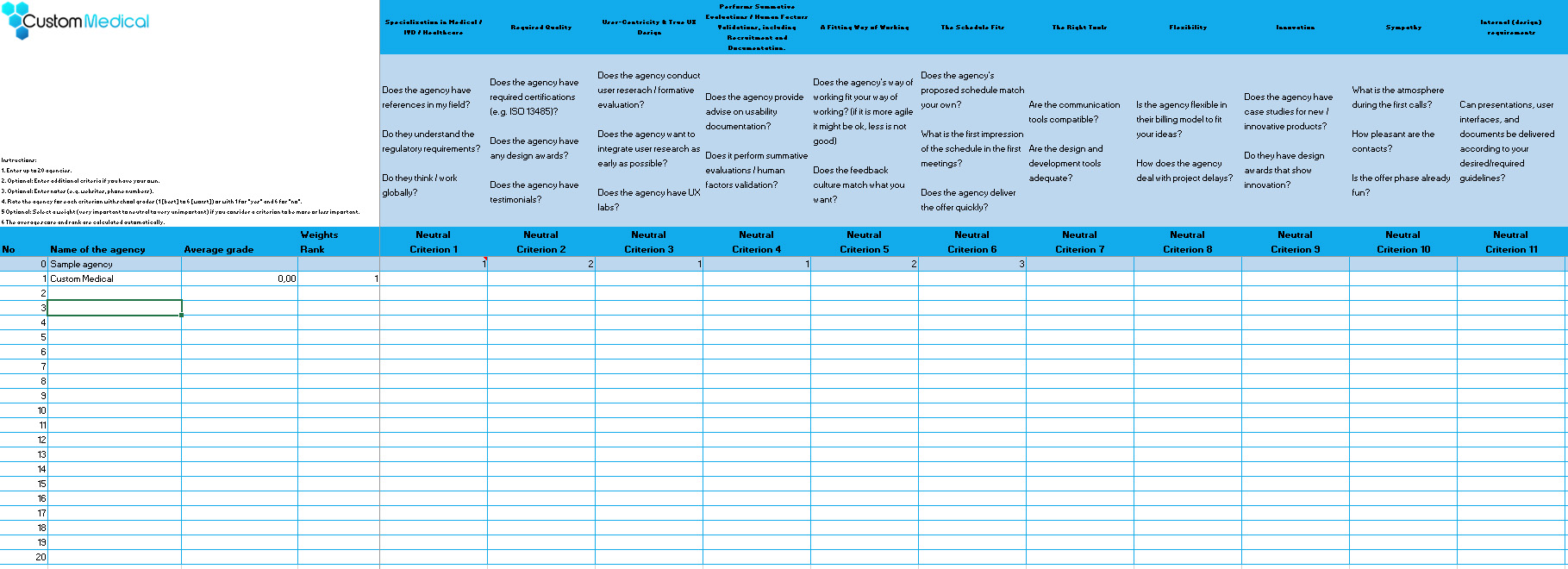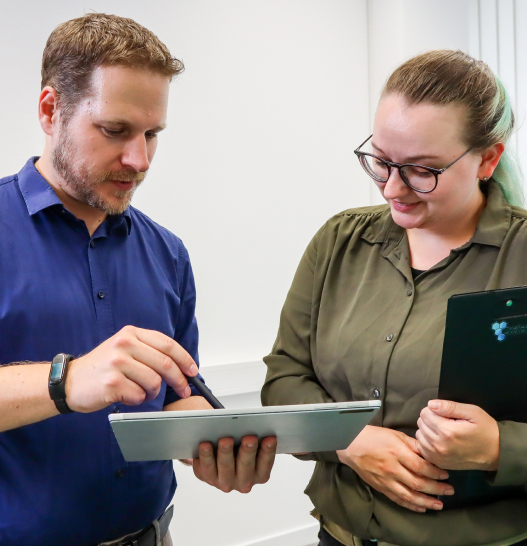Finding a (design) agency is often more difficult than you might think. Many questions arise, such as:
- How do I find the right agency for my product?
- How do I make sure it is a good fit for me and my company?
- How do I make sure it is really specialize in medical, IVD or healthcare products? (and not just say they can do anything…)
These are the questions that this article addresses. After reading it, you will have 10 criteria that you can use directly for comparison. We have also prepared a comparison table for you to download so you can start your agency screening right away. If you are in a hurry, you can jump directly to the table here.
Before we start, a short disclaimer: As a medical design agency, we are naturally biased. We have therefore derived the criteria from real customer requests and presented them neutrally. We hope you will find the best medical design partner for your product. If it is us, we will be delighted.
Enough introduction, let’s get started:
1. Specialization in Medical / IVD / Healthcare
As you know, medical, IVD and healthcare products have their own regulatory and functional requirements. If you rarely or never design such products, you will lack the necessary experience. This is detrimental to your product, your schedule and your budget. You should focus on agencies that specialize in this complex world.
What you should look for:
- References: Medical agencies have an corresponding portfolio. Make sure that the case studies and testimonials provided are relevant to your product.
- Regulatory understanding: Does the agency understand the medical world? Does the agency understand the regulatory requirements for your product?
- International positioning is also a good indicator. Even if not absolutely necessary, medical / IVD / healthcare products are often thought of globally. The agency should also be able to do this.
2. The Required Quality
Every agency says it is good. Every one. But can the agency prove it? Especially in your area?
What you should look for:
- A certified quality management system. For example, if you design a medical device, the agency should be ISO 13485 certified.
- Awards: High-end design awards are a sign of excellence. The work is judged by an independent jury, and only a few are recognized with an award.
- Testimonials & Case Studies: Does the agency have testimonials or quotes from clients? This is usually a sign of high quality, as clients voluntarily put in the effort.
- A clear process: Excellent results do not happen by accident. They are the result of proven and refined processes. The agency should therefore be able to demonstrate that it is not the first time it has done your “type” of project.
3. User-Centricity & True UX Design
In recent years, there has been a strong regulatory focus on the usability of medical and healthcare products. At the same time, user experience (UX) has become increasingly important. This is especially true for products that will be used by lay people or physicians in their own practices. Your agency should therefore be familiar with modern user-centered design.
What you should look for:
- The agency should provide real user research/formative evaluation: The absolute foundation of excellent usability and user experience is user research. Make sure the agency has dedicated user researchers. This is a completely separate discipline from design.
- User-centricity as early as possible: The agency wants to engage with users as early as possible. So they ask a lot of questions about who the users are and what they do. The wrong approach would be to develop/design first and then get into the exchange later.
- Has its own UX labs: A user-centered approach requires dedicated labs. These should of course be adaptable to your product. For example, a medical product used in the operating room should be tested in an OR lab.
4. Performs Summative Evaluations / Human Factors Validations, including Recruitment and Documentation.
This point focuses on medical devices and IVDs. As you know, you must prove that your product is free of unacceptable risks. Therefore, in addition to user-centricity, it is important that the agency can provide this proof. This is the only way to ensure that nothing stands in the way of approval and that you can keep working towards it.
What you should look for:
- The agency should advise you on usability documentation. It is also well versed in regulatory issues. It will help you develop the best strategy for approval.
- Perform regular summative evaluations or at least have a dedicated partner for this. The agency should advise on the best methodologies and can also provide usability documentation on request.
- If the US market is relevant for you, the agency should also carry out human factors validations (including recruitment).
How to Design Compliant Kick-Ass Medical/Health User Interfaces


5. A Fitting Way of Working
Does the agency’s way of working match the way you want to work on the project? Although a user-centered way of working requires an iterative approach, there are big differences in practice.
Some agencies want to design a product “in peace”. Only after this design phase does the technical implementation begin. This approach is more like the waterfall model. Other agencies work in a very agile way and are used to the technical implementation starting at the same time.
What you should look for:
- The agency’s way of working should match your own. It is often easier for an agile agency to work in a waterfall model than vice versa.
- The feedback culture should also match your own. Do you want to be able to see the current status live and actively comment on it? Then you are more suited to an agile agency. If you don’t, then less agile agencies might also be a good fit.
6. The Schedule Fits
You probably have a schedule for your product. This schedule includes other suppliers and any change requires a lot of coordination. The agency you choose should be able to fit into your schedule and deliver results reliably.
What you should look for:
- Does the agency’s proposed timeline match your own? It’s a good sign if an agency can adapt to your schedule so you don’t have to change it.
- Make agreements during the initial meetings: When will the proposal be ready? Does the contact person show up on time? This is a good way to test their commitment to your schedule.
- The speed with which an agency prepares a quote is also an important indicator. If the agency is not fast here, why should it be fast on a project?
7. The Right Tools
Every company has existing tools. For example, for communication or user interface design. Adapting them is always an effort. This should be avoided.
What you should look for:
- Are the communication tools compatible? For example, if you use MS Teams and the agency uses Slack, this is an indication of mismatched tools. Address this. Good agencies can provide the tools you need.
- Are the design and development tools appropriate? Ask to see the agency’s toolset and check for compatibility. Good agencies can and will adapt to your tools.
8. Flexibility
The previous point was already about flexibility. More specifically, the flexibility of the agency regarding working tools. This point is also about flexibility. But this time in terms of billing and changes to the project.
What you should look for:
- The agency’s billing model matches yours or is flexible. For example, if you want a fixed price but the agency only charges by the hour, it is not very flexible. Good agencies offer different billing options.
- How does the agency handle schedule changes? During the proposal phase, discuss what will happen if the project is delayed. You can expect some flexibility here.
9. Innovation
An innovative product sometimes requires you to think outside the box and break new ground. If you are developing such a product, the agency should have experience in this area.
What you should look for:
- Experience with innovation projects: The agency should be able to provide case studies of completely new products.
- Awards: Design awards also show that the agency has experience with innovative products.
10. Sympathy
Although not directly related to project outcomes, in our experience it is an extremely important factor in whether you look forward to working together or roll your eyes before every call.
What you should look for:
- What is the atmosphere during the first calls? How pleasant are the contacts? Is the offer phase already fun?
The Bottom Line
With the criteria mentioned in this article, you can start comparing agencies right away. You can also use the Excel spreadsheet provided. We have already included the criteria from this article. The spreadsheet also includes 7 additional criteria that were beyond the scope of the article. You can also add and weight your own criteria.

We wish you success in selecting your medical (design) agency. If we are involved, we look forward to hearing from you.
- If you are looking for a medical design agency, read here why we think you should consider us.
- Feel free to contact us here.



